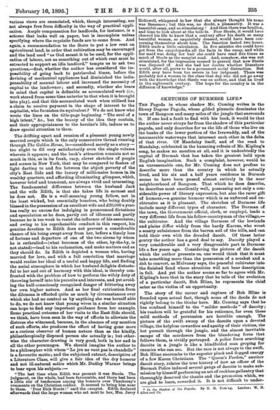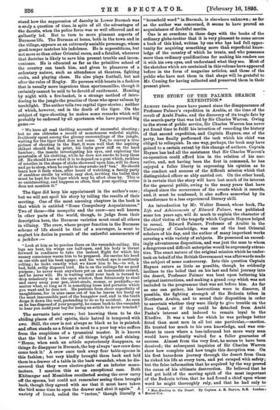SKETCHES OF BURMESE LIFE.*
THE Pagoda in whose shadow Mr. Cuming writes is the Sh way Dagone Pagoda, whose gilded pinnacle dominates the town of Rangoon and many miles of the jungle that surrounds it. If one had a fault to find with his book, it would be that the author never strays far from the shadow of this particular pagoda, and only describes for us the life of those who live on the banks of the lower portion of the Irrawaddy, and of the innumerable waterways that intersect each other in the delta of that river. Of Mandalay itself, and of the road to Mandalay, celebrated in the haunting refrain of Mr. Kipling's song, he makes no mention at all, and it is undoubtedly the capital of Barmah that has taken the greatest hold upon English imagination. Such a complaint, however, would be an unreasonable one, for Mr. Cuming does not profess to describe more than the country in which he actually lived, and his six and a half years residence in Burmah seems to have been passed almost entirely in the near neighbourhood of Rangoon. That which he does describe, he describes most excellently well, possessing not only a con- siderable power of literary expression, but also the rarer gift of humour,—a genuine humour which is as unforced and un- obtrusive as it is pleasant. The sketches of Burmese life include many different types of character. The Burman of the town, the Government official, clerk, or employe, leads a very different life from his fellow-countryman of the village,— the cultivator. And the village Burmese of the lowlands and plains differ widely from the hardy Karens, who wrest a scanty subsistence from the barren soil of the hills, and can hold their own with the dreaded dacoit. Of these latter gentry the author has a good deal to say. Dacoity played a very considerable and a very disagreeable part in Burmese life a few years ago. Considering the picture of the dacoit which the author presents us, one would think that it must take something more than the possession of a musket and a d,ah to convert, as Mulvaney says, the peaceful cultivator into the finished fiend whose atrocities will not bear description in full. And yet the author seems so far to agree with Mr. Kipling's hero that in the story that he tells of the evolution of a particular dacoit, Boh Hline, he represents the chief actor as the victim of an opportunity.
The story of the career and capture of Boh Mine is founded upon actual fact, though some of the deeds do not rightly belong to the titular hero. Mr. Cawing says that he has confined himself to the "milder methods" of dacoity ; his readers will be grateful for his reticence, for even these mild methods of persuasion are horrible enough. The picture of the swift swoop of the dacoits upon a devoted village, the helpless cowardice and apathy of their victims, the hot pursuit through the jangle, and the almost inevitable escape of the murderers from the blundering force that follows them, is vividly portrayed. A police force searching dacoits in a jungle is like a blindfolded man groping for enemies who can see. But the race is not always to the swift. Boh Hline succumbs to the superior pluck and dogged energy of a few Karen Christiana. The "Queen's Pardon," another dacoit story, relates the true history of how an officer of the Burmah Police induced several gangs of dacoits to make sub- mission by himself performing an act of reckless gallantry that thoroughly deserved the thanks and the promotion which, we are glad to learn, rewarded it. It is not difficult to under- • In the Shadow of the Pagoda. By E. D. Cum ng. London; W. H. Allen and Co.
stand how the suppression of dacoity in Lower Barmah was erely a question of time, in spite of all the advantages of the dacoits, when the police force was so well officered and so gallantly led. But to turn to more pleasant aspects of Burmese life. The Burman at home, both in the town and in the village, appears as an extremely amiable personage, whose good-temper matches his indolence. He is superstitious, but not more so than other Oriental races, and a fatalist, wherever that doctrine is likely to save him present trouble and incon- venience. He is educated as far as the primitive school of the country can teach him, and given to pleasures of a sedentary nature, such as attendance at theatres, fighting cocks, and playing chess. He also plays football, but not after the rules of Rugby. He pursues wild-beasts in a fashion that is usually more ingenious than sportsmanlike, though it certainly cannot be said to be devoid of excitement. Hunting by night with a fire-basket, is a strange method of intro-
ducing to the jungle the practise of those who spear salmon by torchlight. The author tells two capital tiger-stories ; neither of which, however, end in the death of the tiger. On the subject of tiger-shooting he makes some remarks which will probably be endorsed by all sportsmen who have pursued big
game:—
" We have all read thrilling accounts of successful shooting ; but no one obtrudes a record of monotonous wakeful nights, fruitlessly spent among the gloomy surroundings of the jungle, -waiting for the tiger that does not come. Yet, to convey a true picture of shooting in the East, it were well that the aspiring shikari should feel, in print, his limbs grow stiff on the hard bamboo ; the insects investigating his eyes, and exploring the penetralia of his clothing, while he dare not smoke to keep them off. He should know what it is to depend on a goat which, reckless of missiles in the shape of sticks showered upon him, will lie down and go to sleep, when he ought to stay awake and ban.' He should learn how it feels when, after hours of watching, a family party of sambhur strolls by within easy shot, inviting the bullet that must be kept for the tiger which may be afoot close by. This is so uninteresting, and happens so often, that your sporting writer does not mention it."
The tiger did keep his appointment in the author's case ; but we will not spoil his story by telling the results of their meeting. One of the most amusing chapters in the book is that which is entitled "Some Compulsory Acquaintances." Two of these—the mosquito and the crow—are well known in other parts of the world, though, to judge from their description here, the Burmese varieties must excel all others in villainy. The crow, whose proper function in the Burmese scheme of life should be that of a scavenger, is wont to neglect his duties in pursuit of the unlawful amusements of a jackdaw :—
" Look at him as he perches there on the verandah-railing. His legs are bent, his wings are half-open, and his body is thrust forward in readiness to take the instant flight for which his uneasy conscience warns him to be prepared. He carries his head on one side and his beak agape; and his wicked eye is restlessly rolling ; he looks exactly what we know him to be,—to wit, a bad, bold, evilly disposed bird. He is on the railings for no good purpose ; he never went anywhere yet on an honourable errand, and he never will. He is waiting until your back is turned to drop noiselessly in at the open window, then feloniously to steal and carry away your pen, shirt-studs, money, or penknife,—no matter what, so long as it is something loose and portable which you want and he does not. He purloins from sheer superfluity of naughtiness, for in nine cases out of ten he leaves his booty on the most inaccessible part of the bungalow roof, and in the tenth drops it down the well, pretending to do so by accident. As soon as he has disposed of your property, he comes back to the verandah to hear you scold your boy for losing an article he never touched."
The servants hate crows ; but knowing them to be the
abiding places of evil spirits, their hatred is tempered with awe. Still, the crow is not always so black as he is painted,
and often stands as a friend in need to a poor boy who suffers from the suspicions of a tyrannical master. It is known that the bird is a lover of all things bright and shining. "Hence, when such an article mysteriously disappears, as things do disappear in Burmah, the boy always saw crow done come took it.' A crow once took away four table-spoons in this fashion ; bat very kindly brought them back and laid them in a drawer of a table in the back verandah, when he die- oovered that they were electro-plate of an inferior manu- facture. I mention this as an exceptional case. Both Khitmugar and Mesalchee recollected seeing the crow carry off the spoons, but could not remember seeing them brought back, though they agreed with me that it must have taken the bird some time to open the drawer and shut it again." A variety of lizard, called the " tuctoo," though literally a
"household word" in Burmah, is elsewhere unknown ; as far as the author was concerned, it seems to have proved an acquaintance of doubtful merits.
One is so overdone in these days with the books of the ordinary globe-trotter that it is very pleasant to come across a book of this kind, written by one who has had fall oppor- tunity for acquiring something more than superficial know- ledge of the country of which he treats, and who possesses more than ordinary qualifications for making his readers see it with his own eyes, and understand what they see. Most of the sketches which are contained in this volume have appeared before in the form of magazine articles, and those of the public who have met them in that shape will be grateful to Mr. Caming for having collected and preserved them in their present place.



































 Previous page
Previous page